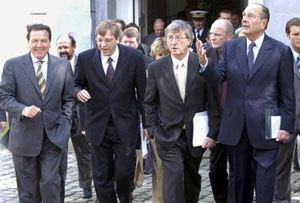|
Anti-War
E.U. Leaders Call For Beefed-Up European Military
 |
|
Chirac,
right, gestures while he walks out with Germany's Chancellor,
left, Belgium's Prime Minister, second left, and Luxembourg's
Prime Minister
|
BRUSSELS,
April 29 (IslamOnline.net & News Agencies) - France, Germany and
two other countries opposed to the U.S.-led war on Iraq called
Tuesday, April 29, in a summit talks for a raft of measures to boost
Europe's self-reliance in defense matters.
But
French President Jacques Chirac, German Chancellor Gerhard Schroeder
and their partners from Belgium and Luxembourg said they did not want
to undermine the U.S.-European alliance or NATO, Agence France-Presse
(AFP) said.
Nevertheless
the proposals -- which went further than forecast by diplomats in the
run-up to the morning summit -- have the potential to provoke disquiet
in Washington and London.
In
particular, talk of a new "European Security and Defense
Union" (ESDU) could be viewed with suspicion in other E.U.
capitals.
The
ESDU would "gather those member states that are ready to go
faster and further in strengthening their defense cooperation",
the four leaders said in a joint statement after two hours of talks.
Such
a development raises the prospect of a two-speed Europe as the E.U.
struggles to forge a common foreign and security policy, which has
been left in tatters by divisions over the war on Iraq.
The
four leaders instructed their defense ministers to establish "not
later than 2004" a European military command headquarters for
joint operations outside the NATO arena.
In
parallel they called for the "nucleus of a collective
capability" offered by E.U. armed forces -- which could spell the
beginnings of an E.U. army.
Much
of the joint statement was directed at the convention now writing the
E.U.'s first-ever constitution, with the leaders calling on the forum
to take their suggestions on board in drafting the text.
All
four countries said other E.U. governments were welcome to join in
their plans. Chirac, who has been at bitter odds with the United
States and Britain over Iraq, also stressed the "fundamental
character" of the transatlantic alliance.
"Our
countries see their commitments in the European Union and in NATO as
complementary commitments," the French president told a news
conference.
"In
building a stronger Europe we obviously contribute to a stronger
Atlantic alliance."
But
the suspicion remains that the four countries are going their own way,
after earlier this year sparking the most serious rift in NATO history
when they refused a US request to beef up Turkey's defences ahead of
war on Iraq.
Encroaching
On NATO's Turf
British
Defense Secretary Geoff Hoon warned the four summit countries against
encroaching on NATO's turf.
"I
stress the importance of the consistency about the harmony of E.U. and
NATO defense, which must be a result of a consensus between all of the
members and the new members of the E.U.," Hoon said while on a
visit to Hungary.
Along
with France, Britain is one of the E.U.'s few military heavyweights,
and observers say its armed forces must be at the heart of any
credible European defense strategy.
The
plans will be presented to the 11 other E.U. nations at a meeting of
foreign ministers this weekend on a Mediterranean cruise, and taken up
again at an E.U. summit in June at Thessaloniki, Greece.
Spanish
Foreign Minister Ana Palacio gave an indication of the likely
reception by saying attempts to build a defense policy outside the
full E.U. "had no right to be called European".
She
told the Spanish parliament that the Brussels meeting, called "at
a time of controversy, is also a divisive factor within the Union and
could prove counterproductive".
But
Schroeder said the E.U.'s enlargement next year to 25 countries made
it more pressing than ever to forge a common security policy.
"I
underline that in NATO, we don't suffer from too much America, we
suffer from not enough Europe," he also said.
NATO,
while warning against "unnecessary duplication", gave a
guarded welcome to the proposals, which included a commitment to
upgrade military spending by countries that -- France apart -- spend
relatively little on defense.
"NATO
welcomes any action of NATO members to strengthen the European pillar
of the transatlantic alliance," said an alliance spokesman, Yves
Brodeur.
No
Need For New E.U. Military Command: Powell
For
his part, U.S. Secretary of State Colin Powell said Tuesday that the
United States saw no need for a new E.U. military command.
Powell
also downplayed the significance of the call, noting that only four of
the 15 European Union members had signed on to the proposal.
"Four
of the nations of the union have come together and created some sort
of a plan to develop some sort of a headquarters," Powell told
the Senate Foreign Relations Committee in dismissive fashion.
"It's
only four nations," he said. "Of the many nations that could
have attended, only four did attend.
"What
we need is not more headquarters," Powell said. "What we
need is more capability and fleshing out of the structure and the
forces that are already there."
|